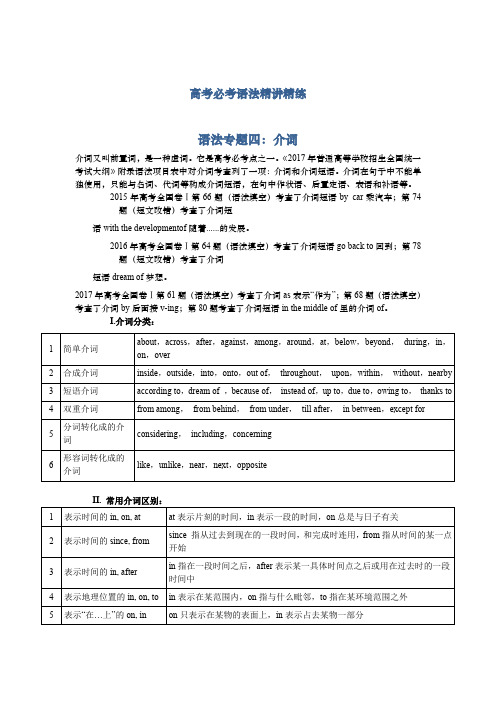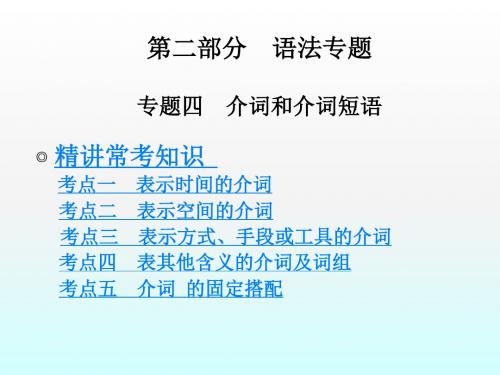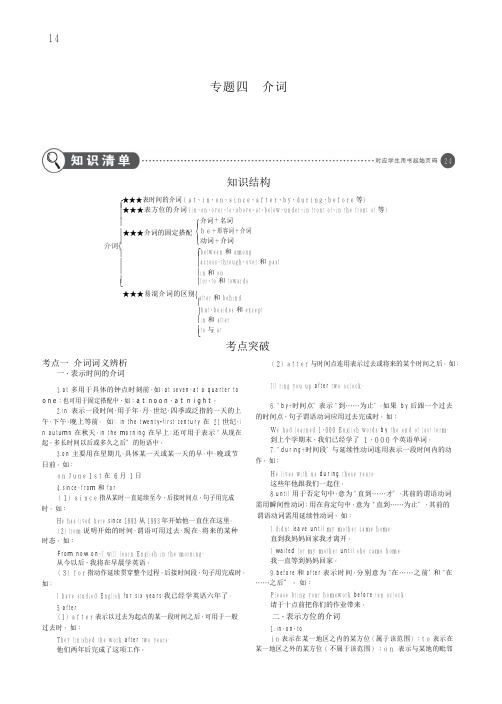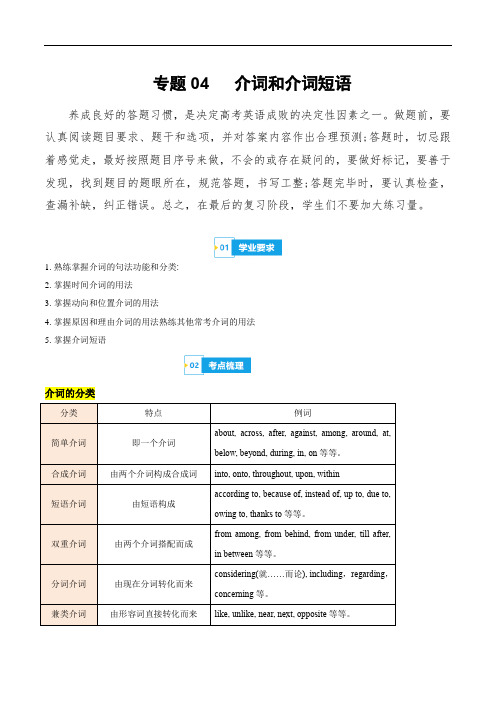专题四 介词与介词短语
- 格式:ppt
- 大小:3.38 MB
- 文档页数:64

高考必考语法精讲精练语法专题四:介词介词又叫前置词,是一种虚词。
它是高考必考点之一。
《2017年普通高等学校招生全国统一考试大纲》附录语法项目表中对介词考查列了一项:介词和介词短语。
介词在句子中不能单独使用,只能与名词、代词等构成介词短语,在句中作状语、后置定语、表语和补语等。
2015年高考全国卷Ⅰ第66题(语法填空)考查了介词短语by car乘汽车;第74题(短文改错)考查了介词短语with the developmentof随着......的发展。
2016年高考全国卷Ⅰ第64题(语法填空)考查了介词短语go back to回到;第78题(短文改错)考查了介词短语dream of梦想。
2017年高考全国卷Ⅰ第61题(语法填空)考查了介词as表示“作为”;第68题(语法填空)考查了介词by后面接v-ing;第80题考查了介词短语in the middle of里的介词of。
I.介词分类:III.高考英语短文改错及语法填空考点分析及训练·介词考点规律分析:短文改错对介词的考查主要涉及在及物动词后接宾语时误加介词和在不及物动词后接宾语时漏加介词、可直接用作状语的副词短语前误加介词、介词与其他词的常用搭配、常用介词的基本用法、习语中的介词用法等。
语法填空主要涉及介词的选择。
介词单句改错之真题训练:1. Bill insisted in staying near the car.2. Suddenly we caught sight at a car and some men.3. When I have free time I go a long walk.4.When they came down the police were angry to them.5. Most people can quickly get for help from a doctor or go to a hospital since they are ill.6. …and some books, for example, books for history, science, cooking and gardening are also popular.7. I never knew about a ride down a river could be so exciting.8. It was very kind for them to meet me at the railway station.9. In fact, they are planning to visit China in next year.10. We practise for three times every week.11.We must keep in mind that we play for the team instead ourselves.12. Unfortunately, there are too many people among my family.13. I was happy with any programme but the others spent a lot time arguing…14. Thanks very much on inviting me to your birthday party on Sunday.15. So I’m really sorry that I won’t be able to come in this time.16. …but we do not seem to get much time to talk about together.17. For instance, on one night he played strong and loud music till four o’clock in the morning.18.I was so tired that I fell asleep at the moment my head touched the pillow.19. His parents asked him to spend in more time preparing for the college entrance examination.20.I feel sorry to him.21.Because so much viewing, children may not develop the habit of reading and the ability to enjoy themselves.22. On one year the average child will see 25,000 television commercials…23. The main problem was in that I always thought in Chinese…24. I’m sure they will laugh to me and see me as a fool. So I feel unhappy every day.25. You can find all kinds information in just a few minutes on the Internet.26. But I have spent lots my money, …27. …you will probably want to join in the Stamp Collectors’ Club…28. We have a lot on common and have a lot to talk about.介词单句改错之模拟训练:1. We must serve for the people heart and soul.2. I followed the man for a while, and saw him enter into the bank.3. Soon the nurse married with my friend Jim.4. I took a great many of photographs in the mountains.5. In English class, we often talk each other in English.6. Don’t talk. What the man says is well worth listening.7. The chair looks hard, but it is comfortable to sit.8. She was very kind and insisted lending her car to us.9. I asked to her what she would be doing on Saturday.10. Are you glad to be going to back to school?11. On his way to home, he met one of his old friends Jack.12. Please close the door at next time you come in.13. Thousands of people go to the seaside in every year.14. We can finish the work either this week or in next week.15. We walked down the stairs instead taking the elevator.16. We could not have heard them because the noise from the river.17. Don’t be angry to me for not having written—I was really too busy.18. I’ve read a lot books about a nimals.19. He invited us to dinner, which was very kind for him.20. I knew that there was no hope on the moment I saw him.21. Don’t go by plane. It’s a lot of more expensive.22. Except milk and cheese, we all need vegetables.23. On my way back, I called at Mr Smith at his office.介词单句改错之提升训练:1. His father has been ill on bed for two years.2. During the summer vacation, he worked in the farm.3. He is very fond of football and he is in the school football team.4. I have made rapid progress under the help of my teacher.5. Don’t read under the strong light.6. The killer ran away to the direction of Beijing.7. He lives on No.124. Wuyi Road.8. He is very angry to his son for his failing in the exam.9. He hit me on the face.10. He is strict to me in my work.11. The bottle is filled of the gas.12. London stands to the Thames.13. His mother took pride of his great achievements.14. There are two windows on the wall.15. On the way home, I found I had lost the key of the door.16. We are trying to find the answer of the problem.17. You are required to write your story with your own words.18. With what language did she make the speech?19. He is the cleverest in all the students.20. At a clear night, he went out in search of the gold.21. He had an English party at Christmas Eve.22. Women should be equal with men.23. He is blind on both his eyes.24. Uncle Tom is famous as his skill in cooking.25. He will come back after five weeks.26. He said that he had met us many years ago.27. He is the tallest between the four of us.28. I called on my uncle’s last night.29. It is very clever for a dog to save its owner.30. You should be beware to dangers.介词单句语法填空之真题训练:1.That young man is honest,cooperative,always there when you need his help. ______short,he’s reliable.2.In addition ________ the school,the village has a clinic,which was also built with government support.3.The dictionary is of date:many words have been added to the language since it was published. 4.My connection with pandas goes back ________ my days on a TV show in the mid-1980s. 5.My uncle says that he never dreams _______becoming rich in a short period of time.6.Most of us are more focused_______our tasks in the morning than we are later in the day.7.Are you interested ________ becoming a musician and getting a recording contract(合同)?8.Five years ago, when I taught art at a school in Seattle, I used Tinkertoys as a test ________ the beginning of a term to find out something about my students.9.Chopsticks are not used everywhere in Asia.In India, for example, most people traditionally eat________their hands.10.Now I am leaving home __________ college.At last, I will be on my own, but I still want to have my parents to turn to whenever I need help.11.In high school, I became curious ________ the computer, and built my first website.12.Find an issue you are interested in and learn more.V olunteer or, if you can, contribute a little money ________a cause.13.The mother continued to care for the young panda________more than two years.14.Parents should actively urge their children to take advantage________the opportunity to join sports teams.15.Shelly-Ann is a little woman ________ a big smile.She has mental toughness that did not come about by chance.16.The Scottish girl ________ blue eyes won the first prize in the Fifth Chinese Speech Contest.17.Jane is in a hurry because the train to the airport leaves ________ half an hour.18.Human life is regarded as part of nature and, as such, the only way for us to survive is to live ________ harmony with nature.19.The whole team count ________ Cristiano Ronaldo, and he seldom lets them down.20.Many of the things we now benefit from would not be around but ________ Thomas Edison.21.Have you ever heard of the trees that are homes ________ animals both on land and sea?22.Most people work because it's unavoidable._______ contrast, there are some people who actually enjoy work.23.We tend to have a better memory for things that excite our senses or appeal _____our emotions than for straight facts.24.These comments came in response_____ specific questions often asked by local newsmen.25.This meeting room is a non-smoking area.I would like to warn you _____ advance that if you smoked here you would be fined.学习札记:_______________________________________________________________________________ _______________________________________________________________________________ _______________________________________________________________________________ ____________________________________________________________参考答案及解析介词单句改错之真题训练:1.in 改为on,insist on 为固定搭配2.at 改为of,catch sight of是习语,意为“看见”3.go 后加for,go for a walk 是习语4.to 改为with,要表示对某人生气,英语习惯上用be angry with sb5.去掉for,因其前的get 是及物动词6.books for 改为books on,此处的on 意为“关于”7.去掉about 或将about 改为that,因动词knew 后可直接跟宾语从句,无需用介词8.for 改为of,注意句型It’s kind of sb to do sth9.去掉in,在由next, this, last 等构成的时间短语中,一般可直接用作时间状语,无需加in, on, at 这样的介词10.去掉for,在表示频率的名词前通常不加介词11.instead 后加of,instead of 为复合介词,在此表示“而不是”12.among 改为in,in my family 意为“在我家里”13.a lot 后加of,因a lot 不能直接修饰名词14.on 改为for,thanks for doing sth 意为“因某事而感谢某人”15.去掉in,因this time 可直接用作状语16.去掉about,因about 后没有接宾语,about 属多余17.去掉on,因one night 可直接用作状语18.去掉at,the moment 在此用作连词,相当于as soon as19.去掉in,spend 是及物动词,其后可直接跟名词作宾语20.to 改为for,be / feel sorry for sb 意为“为某人感到难过”21.Because 后加of,因so much viewing 相当于名词22.On 改为In,意为“在一年中”23.去掉that 前的in,was 后是一个以that 引导的宾语从句,in 是多余的24.to 改为at,laugh at 意为“嘲笑”25.kinds 后加of,a kind of 意为“一种……”,all kinds of…意为“各种各样的……”26.lots后加of,lots / a lot后不能接名词;后接名词时,要用lots of…,a lot of…27.去掉in,表示“参加,加入”某个组织,join 后不要再加介词in;表示“参加”某项活动时,才加in28.on 改为in,因为have sth in common 是固定搭配,意为“有共同的……”介词单句改错之模拟训练:1. 去掉for,serve 表示“为……服务”,是及物动词,后接宾语时无需用介词。

专题四介词与介词短语(一)方位介词1.图解常见的方位介词2.along, through, across, over3.at, on, to, in4.between, among(1)between 在……之间(指两者),常和and 连用。
The building stands between the park and the small river. 那栋楼位于公园和小河之间。
(2)among在……之间(指三者或三者以上)。
We'll visit a town among the mountains.我们将要参观一个被群山环绕的小镇。
[名师指津]如果指三个及三个以上的人或物中的每两个之间,仍然要用between。
Switzerland lies between France, Italy, Austria and Germany.瑞士位于法国、意大利、奥地利和德国之间。
(二)时间介词1.in, afterin表时间,常表示“在……之内”,有时in还有“在……之后”的意思,但表示此意时,必须具备两个条件:(1)所在句子的谓语动词必须表将来;(2)后面必须是一段时间。
这两个条件缺一不可,否则用after或later。
My father will be back in three days.我父亲将在三天以后回来。
My father will be back after three o'clock.我父亲将在3点后回来。
My father came back after three days/three days later.我父亲是三天后回来的。
2.for, from, sinceretirement.布朗先生喜欢乡村生活,退休后他在那里生活了差不多15年。
My younger sister began to learn dance from the age of five.我的妹妹从5岁开始学习舞蹈。






介词和介词短语1.The train leaves at 6:00 pm.So I have to be at the station ________ 5:40 pm at the latest.A.until B.afterC.by D.around解析:句意:火车将在下午六点出发。
因此,我最迟应该在下午5:40前到达车站。
根据语意可知,此题应填介词by意为“不迟于,在(某时)之前〞。
until意为“直到〞;after 意为“在……之后〞;around表示“大概,大约〞都不符合题意。
答案:C2.—Do you go there ________ bus?—No, we go there ________ a train.A.in;on B.on;onC.by;in D.by;with解析介词与表示乘坐交通工具的名词连用时,假设交通工具名词前无冠词,用介词by;假设有冠词、物主代词修饰交通工具名词时,如此用介词in或on。
句意:——你们乘公共汽车去那里吗?——不,我们乘火车去。
答案:C3.A good advertisement often uses words ________ which people attach positive meaning to attract people to buy a product or service.A.to B.ofC.for D.with解析:“________ which people attach positive meaning〞可理解为“people attach positive meaning to which〞。
attach...to...意为“把……附在……上〞;to attract people to buy a product or service 作目的状语。
答案:A4.________ your timely help, I couldn't have finished the work on time. I can't thank you too much.A.Rauter than B.Except forC.In addition to D.But for解析:考查介词词组。



专题四介词和介词短语综合演练Ⅰ.语法填空(2018福建厦门一次质检)“Do the difficult things while they are easy and do the great things while they are small.” “Nothing is softer and1(flexible)than water, yet nothing can resist it.”These are the food for thought2(serve)to tube passengers at Oval station in south London. It's been 14 years since customer services manager Anthony Gentles3(inspire)to brighten up the “blank faces” of travelers with daily4(wise)from his favorite book, Tao Te Ching. Every day he wrote one quote on the board5 (him). Mr. Gentles said offering quotes from ancient China was his way of6 (try)to make people feel more welcome as they braved the Underground.Thousands of quotes later, Mr. Gentles' favorite message remains the first one he wrote:“A journe y of a thousand miles begins7 a single step.” “Because it's8 (fundamental)true,” he said. “No matter9you live your life, regardless of your situation, you have to take the first step.”Since 2007,the baton(接力棒)has been taken on by his colleague Glen Sutherland, 10quotes on the station information board have set off a wave of enthusiasm to copy the practice across the capital.1. 2. 3. 4. 5.6.7.8.9.10.答案[语篇解读]英国伦敦南部的欧维尔地铁站站口的信息板上写着名言,欧维尔地铁站已经坚持这个传统14年了。

专题04 介词介词的基本考点:1.介词的分类2.介词固定搭配一)、介词的分类1. 表示时间的介词(1)表示“在…之时”的介词in, on, at①in 表示某年、某季节、某月及一般(非特指)的早、中、晚等。
如:in summer 在夏天in January 在一月in 2012 在2012年in the morning 在上午①on 表示具体某一天及某一天的早、中、晚。
如:on August 8th 在8月8日on Monday 在星期一on New Year’s Day 在元旦on a cold morning 在一个寒冷的早晨on Sunday afternoon 在周日下午①at 表示某一时刻或比较短暂的时间。
如:at 5:10 在5点10分at the beginning of… 在…的开端at the end of 在…的末尾at the age of 在…岁时at night 在晚上at noon 在正午at the same time 与此同时注意:在this, that, last, next, every 等词之前一律不能直接加介词。
如:I went to Hangzhou last Sunday.我在上周日去了杭州。
(2)表示“在…之后”的介词after, inafter接时间段,只能用于过去式;接时间点,可以用于将来时。
in 接时间段,用于将来时。
①He came back after three days.三天后他回来了。
①He will come here after four.4点后他要来这里。
①He will come back in a week.他会在一周以后回来。
(3)表示一段时间的介词for, since, by, from… to, until/till①for 表示一段时间。
可以指过去、现在或将来,着重说明“多久(how long)”。
如:My uncle has lived in Washington for more than two years.我的叔叔在华盛顿住了两年多。


专题四介词与介词短语(一)方位介词1.图解常见的方位介词2.along, through, across, over3.at, on, to, in4.between, among(1)between 在……之间(指两者),常和and 连用。
The building stands between the park and the small river.那栋楼位于公园和小河之间。
(2)among在……之间(指三者或三者以上)。
We'll visit a town among the mountains.我们将要参观一个被群山环绕的小镇。
[名师指津]如果指三个及三个以上的人或物中的每两个之间,仍然要用between。
Switzerland lies between France, Italy, Austria and Germany.瑞士位于法国、意大利、奥地利和德国之间。
(二)时间介词1.in, afterin表时间,常表示“在……之内”,有时in还有“在……之后”的意思,但表示此意时,必须具备两个条件:(1)所在句子的谓语动词必须表将来;(2)后面必须是一段时间。
这两个条件缺一不可,否则用after或later。
My father will be back in three days.我父亲将在三天以后回来。
My father will be back after three o'clock.我父亲将在3点后回来。
My father came back after three days/three days later.我父亲是三天后回来的。
2.for, from, sinceretirement.布朗先生喜欢乡村生活,退休后他在那里生活了差不多15年。
My younger sister began to learn dance from the age of five.我的妹妹从5岁开始学习舞蹈。


⎪⎧ ⎪ {⎪14专题四 介词知识结构★★★表时间的介词( at、in、on、since、after、by、during、before 等)⎪★★★表方位的介词( in、on、over、to、above、at、below、under、in front of、in the front of 等) ⎪⎪★★★介词的固定搭配 介词⎨⎪ ⎪ ⎪ ⎪ ⎩ 介词+名词 be+形容词+介词动词+介词 ⎧⎪between 和 among ⎪across,through,over 和 past ⎪in 和 on ⎪for,to 和 towards ★★★易混介词的区别⎨after 和 behind⎪but,besides 和 except ⎪in 和 after ⎪⎩to 与 at考点一 介词词义辨析一、表示时间的介词考点突破( 2) after 与时间点连用表示过去或将来的某个时间之后。
如: 1.at 多用于具体的钟点时刻前,如:at seven,at a quarter to one;也可用于固定搭配中,如:at noon,at night。
2.in 表示一段时间,用于年、月、世纪、四季或泛指的一天的上午、下午、晚上等前。
如: in the twenty⁃first century 在 21 世纪,in autumn 在秋天,in the morning 在早上;还可用于表示“ 从现在起,多长时间以后或多久之后” 的短语中。
3.on 主要用在星期几、具体某一天或某一天的早、中、晚或节日前。
如:on June 1st 在 6 月 1 日4.since,from 和 for( 1) since 指从某时一直延续至今,后接时间点,句子用完成 时。
如:He has lived here since 1993.从 1993 年开始他一直住在这里。
(2) from 说明开始的时间,谓语可用过去、现在、将来的某种 时态。


完整版)初中介词和介词短语专题讲解(含练习)介词及介词短语介词是一种虚词,用来表示名词或相当于名词的其它词语在句中的关系,不能单独使用。
介词可与名词或相当于名词的其它词构成介词短语。
介词短语可在句中作定语、状语、表语和宾语补足语。
例如:那个男孩子是XXX的兄弟。
(定语)女孩子两小时后回来。
(状语)介词分为简单介词和复合介词。
常用的简单介词有at、in、on、about、across、before、beside、for、to、without等。
复合介词如by means of、along with、because of、in front of、instead of等。
表时间的介词有以下几种用法:1)at。
in。
on表示时间点用at。
例如:六点钟、中午、午夜。
表示在某个世纪、某年、某月、某个季节以及早晨、上午、下午、晚上时,用in。
例如:19世纪、2002年、五月、冬天、早上、下午等。
表示具体的某一天和某一天的上午、下午、晚上时,用on。
例如:星期一、7月1日、星期日早上等。
2)since。
after由since和XXX引导的词组都可表示从过去某一点开始的时段,但since词组表示的时段一直延续到说话的时刻,因而往往要与现在完成时连用。
而after词组所表示的时段纯系过去,因而要与一般过去时连用。
例如:我自去年夏天以来就没有收到他的消息。
(现在完成时)五天后,那个男孩回来了。
(一般过去时)3)in。
afterin与将来时态连用时,表示“过多长时间以后”的意思,后面跟表示一段时间的词语。
after与将来时态连用时,后面只能跟表示时间点的词语。
文章中介绍了表示时间和地点的常用介词的用法辨析。
当表示一段时间时,应该使用after与过去时态连用,后面跟表示一段时间的词语。
例如:He returned after a month。
当表示地点时,at一般指小地方,in一般指大地方或某个范围之内,on往往表示“在某个物体的表面”。

专题04 介词和介词短语养成良好的答题习惯,是决定高考英语成败的决定性因素之一。
做题前,要认真阅读题目要求、题干和选项,并对答案内容作出合理预测;答题时,切忌跟着感觉走,最好按照题目序号来做,不会的或存在疑问的,要做好标记,要善于发现,找到题目的题眼所在,规范答题,书写工整;答题完毕时,要认真检查,查漏补缺,纠正错误。
总之,在最后的复习阶段,学生们不要加大练习量。
1.熟练掌握介词的句法功能和分类:2.掌握时间介词的用法3.掌握动向和位置介词的用法4.掌握原因和理由介词的用法熟练其他常考介词的用法5.掌握介词短语介词的分类考点① 介词短语的功能介词不能独立在句中做成份,介词后必须与名词、代词、或动名词构成介词短语在句中充当一个成分,表示人、物、事件等与其它人、物、事件等之间的关系。
考点① 常考介词的辨析No.1 表示“时间”的介词at, on , inat表示时刻、时间的某一点;at noon, at 7 o’clock, at dawn, at daybreak, at sunrise, at Christmason表示具体的某一天,某一天的上、下午或晚上;on October 1st, on a rainy day, on National Dayin表示月、季节、年,泛指上午、下午、晚上(在一段时间内); in Ming Dynasty, in September, in the morning before表示“在……之前”;after表示“在……之后”。
I will be back before lunch.午饭之前我赶回来。
The nights start after half past five in winter.冬天的夜晚在5点半之后开始。
by, until/till, by, untilby表示“在……之前,截止到……”;until/till表示“直到……为止”;by表示到什么时候为止动作已经完成;until表示动作持续到什么时候,在终止性动词的否定式中,二者通用。